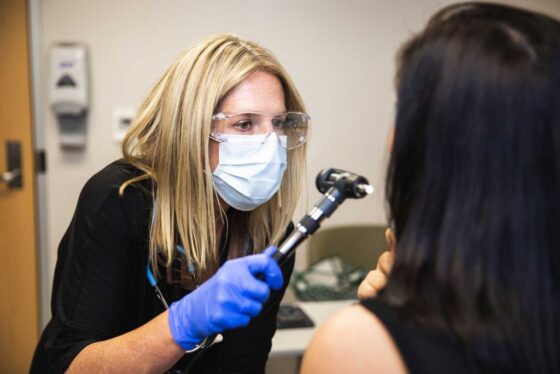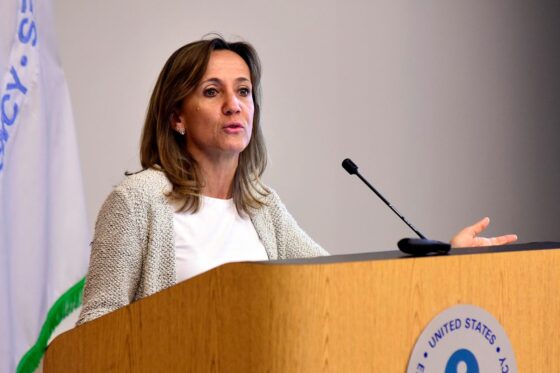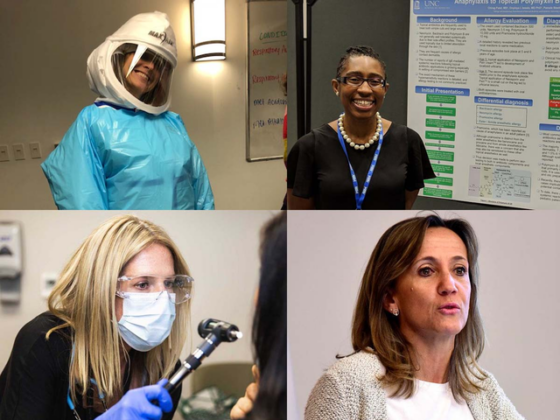 It's International Day of Women and Girls in Science, a day designated by the United Nations to recognize women and girls in science as agents of change. Every day, they're overcoming significant gender gaps in science, technology, engineering, and math (STEM) disciplines, and empowering other women and girls to do the same.
It's International Day of Women and Girls in Science, a day designated by the United Nations to recognize women and girls in science as agents of change. Every day, they're overcoming significant gender gaps in science, technology, engineering, and math (STEM) disciplines, and empowering other women and girls to do the same.
To celebrate, we are highlighting some of UNC Health's own women in science, sharing their journey to success, challenges they faced along the way and advice they'd like to give others.
Associate Professor of Medicine, Division of Infectious Diseases at UNC School of Medicine
Medical Director, UNC HIV Cure Center
- Why did you decide to pursue a career in science/medicine?
Science and medicine provide a wonderful combination of a life focused around intellectual curiosity and ongoing learning with the ability to focus both on the pursuit of solving problems, big and small. It allows for a career and life driven by purpose.
- What challenges have you faced as a woman in science?
I have benefited from many women who forged a path before me, such that I find the biggest challenges are those faced by the research endeavor itself. Biases against women certainly exist, but I choose to focus on the work rather than limitations others might try to impose or suggest.
- What advice would you give to other women pursuing a career in science?
As with any career, pick a field and questions that excite you and are meaningful to you. Surround yourself with people who are supportive, positive, kind and challenge you. Put effort into building your confidence so you have it when you need it. Seek the advice of other women in science and other fields on how to find your balance of work and the rest of life.
- Why is it important to celebrate women and girls in science?
We all need to see women and girls in science to encourage girls and boys to pursue whatever career is the right fit for them. It is a real gift for children to grow up believing that all options are open to them. It is important for girls and boys to see smart women lead, advocate and thrive within their families. We change the biases by celebrating what women and girls achieve.
- What does the future look like for women and girls in science?
Limitless.
Assistant Professor, Division of Rheumatology, Allergy and Immunology, UNC School of Medicine
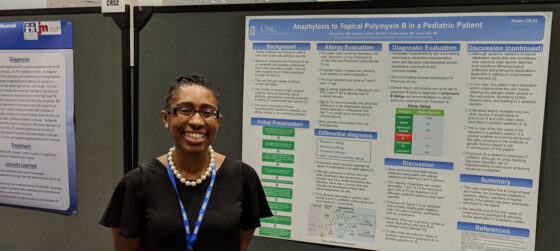
- Why did you decide to pursue a career in science/medicine?
I had the combined examples of my parents. My mom pursued a PhD in economics, and my dad pursued an MD and a career as a surgeon and a family medicine and emergency department physician. Their achievements were inspiring and influential in my career choice. On top of this, in 9th grade biology, I discovered that I loved our unit on proteins, lipids, carbohydrates and nucleic acid. From that day, I vowed that whatever my job was, it would somehow involve exploring these molecules. The joy and amazement of all the different things to study in my field drive me now. My current career in science and medicine allows me to explore the questions that intrigue me, but it also gives me a chance to contribute to the improvement of at least one person's health and quality of life.
- What challenges have you faced as a woman in science?
Learning how to cope with individuals who discount your medical or scientific contributions or have difficulty envisioning you as a leader or expert in science and medicine because of the way you look.
Feeling invisible or overlooked in certain circumstances and feeling hyper visible in others.
Learning how to balance all the competing interests in my limited time, including:
- Being compassionate, caring, and available to my patients.
- My sense of obligation to take on service to my field and my institution whenever I am asked.
- Wanting to give back to my institution and field through mentorship.
- Preserving opportunities for reading, writing and critical thinking essential to push my research forward and being available for my lab members.
- Family and life outside of my career in science and medicine.
- What advice would you give to other women pursuing a career in science?
Talk to your peers and talk to the people who are just a little bit ahead of you and learn strategies from them on how to push your science and your career forward. You can also end up teaching them and encouraging them. Remember you have a lot to offer, no matter what stage of your career you are in.
- Why is it important to celebrate women and girls in science?
Historically, women and girls in science (as well as outside science in so many other fields) have been less visible, and their voices and ideas have not always been heard or taken seriously. The more we celebrate women and girls in science, the more all of us can accept that women and girls have a place in science as well. We belong and we should be encouraged to explore and make mistakes. This is what may lead to the next big discoveries that can benefit us all.
- What does the future look like for women and girls in science?
The future looks more promising for women and girls in science. Many scientific fields are starting to recognize and name the issues related to the underrepresentation of women in particular fields and issues related to diversity, equity and inclusion in science. This is the first step to making science an exciting career choice for everyone.
Dr. Emily Sickbert-Bennett, PhD, MS
Director, UNC Medical Center Infection Prevention
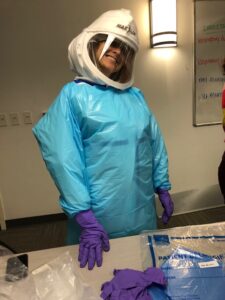
Associate Professor of Infectious Diseases, UNC School of Medicine
Administrative Director, UNC Medical Center Antimicrobial Stewardship Program
- Why did you decide to pursue a career in science/medicine?
I first recognized my passion for infectious diseases and epidemiology as a high school student. After reading Richard Preston's book "The Hot Zone" about investigating an Ebola outbreak, I announced to my AP Biology teacher that one day that's what I wanted to be doing. His response… he told me I was crazy! That obviously didn't deter me from continuing my studies at UNC-Chapel Hill to get my bachelor's degree in biology, master's degree in environmental microbiology and then doctoral degree in infectious disease epidemiology at Gillings School of Global Public Health. I loved the multidisciplinary work of epidemiology that allows for collaboration across multiple disciplines to solve important public health issues. Little did I know that all this training was the groundwork for my now 17-year career in infection prevention at UNC Health, where I serve as the Director of Infection Prevention leading an inspiring team through a global pandemic.
- What challenges have you faced as a woman in science?
As a female PhD scientist, a very underrepresented group, I have had to work very hard to find my voice to effectively share my expertise and experience. Many people (especially prior to the pandemic) do not understand the science of epidemiology and infection prevention; therefore, my role and contribution to efforts can be easily overlooked.
- What advice would you give to other women pursuing a career in science?
Find mentors who respect and support you. Find work you are passionate about and hold on to the aspects that spark your passion. Become a mentor to others, especially those who are underrepresented. Help others excel and find their voice.
- Why is it important to celebrate women and girls in science?
We need diversity in science. Science is strengthened by multiple perspectives. Different disciplines and different people provide more complete understanding to our most compelling scientific questions. We should celebrate and appreciate women and girls in science every day!
- What does the future look like for women and girls in science?
The future is as bright as our reflection of the light in each in other. There are more opportunities than ever to train in different fields of science. Knowledge sharing happens in milliseconds across the Internet. International collaboration is as possible as negotiating time zones for virtual meetings.
Professor, Department of Pediatrics, Microbiology and Immunology and Department of Environmental Sciences and Engineering at UNC Gillings School of Global Public Health
Director, Curriculum in Toxicology
Deputy Director, Center for Environmental Medicine, Asthma and Lung Biology
- Why did you decide to pursue a career in science/medicine?
I have always liked the intersection between chemicals and biological functions, specifically how chemicals can modify biology.
- What challenges have you faced as a woman in science?
The constant feeling that I have to be twice as good to earn the same respect as my male colleagues. Being petite certainly does not help!
- What advice would you give to other women pursuing a career in science?
Make sure you have a partner or support structure that can help balance the demands of your job while finding time for things outside of your job.
- Why is it important to celebrate women and girls in science?
Women constitute 50 percent of the population - their viewpoints and perspectives need to be represented in science.
- What does the future look like for women and girls in science?
Excellent! Increased awareness of the importance of having women in science and the value they bring to the different fields are signs of a great future of women and girls in science.

